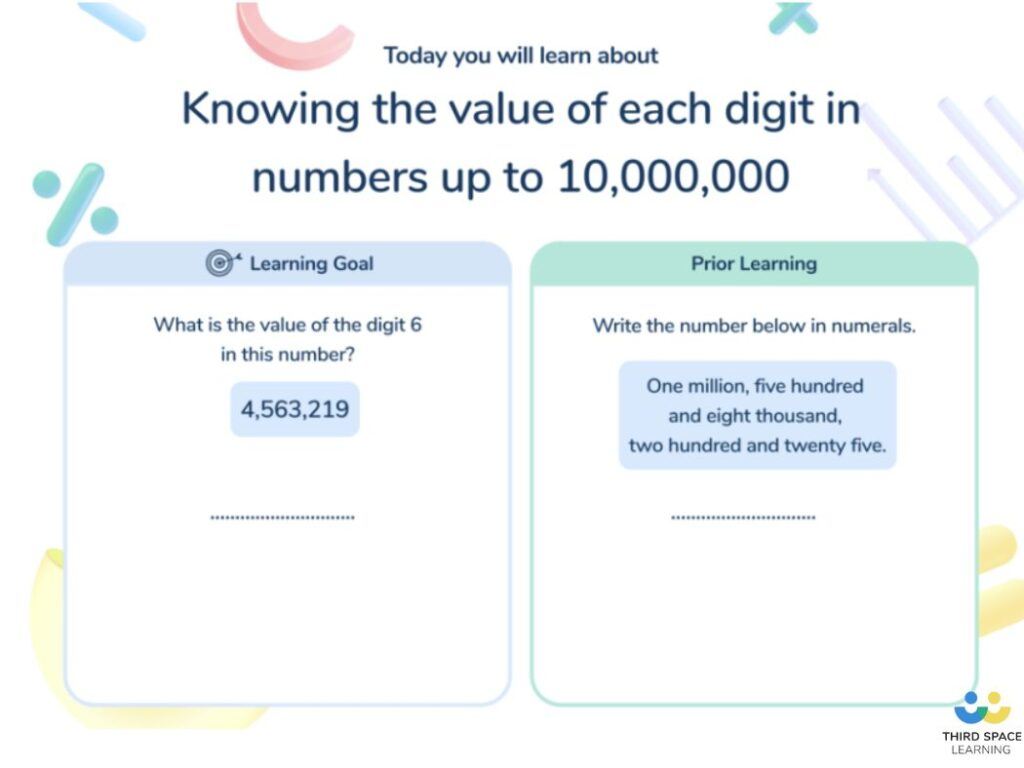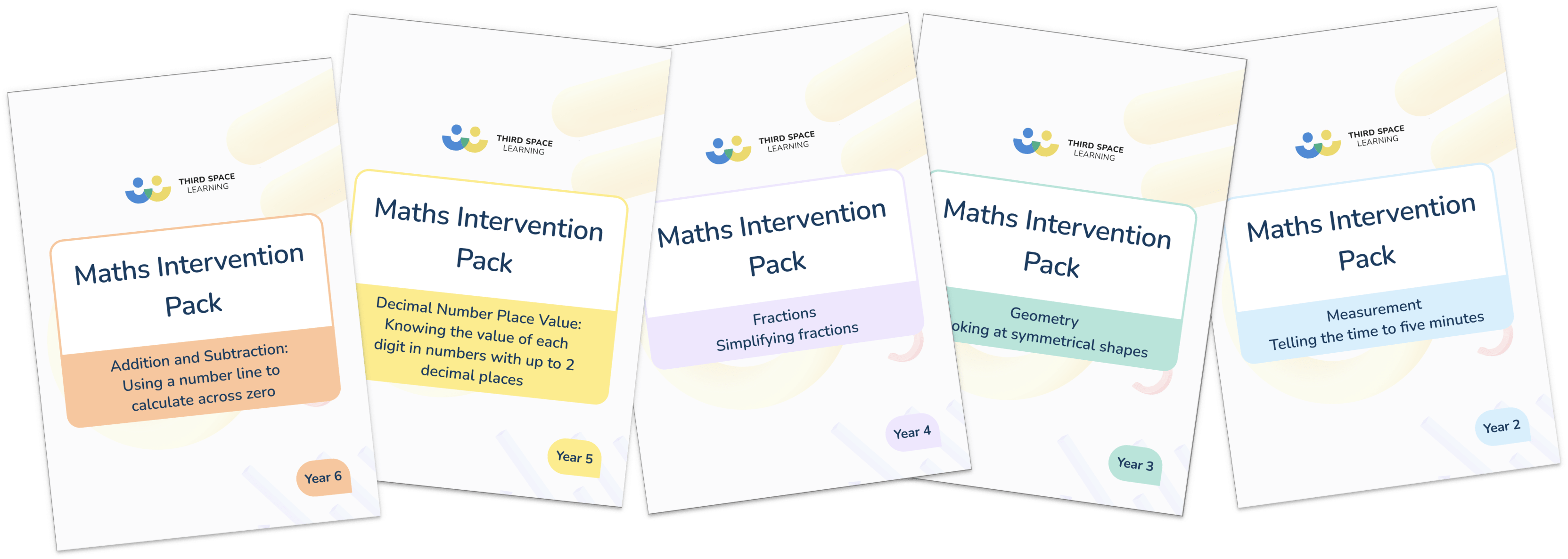Why Maths KS2 SATs Interventions Shouldn’t Start in Year 6
Every week of every term in the school year, our 1-to-1 maths interventions are to some degree preparing pupils for their KS2 SATs. Whether working with pupils from Year 3, Year 4, Year 5 or Year 6, our specialist maths tutors will be plugging gaps, teaching KS2 SATs contents and giving pupils skills to tackle their arithmetic and reasoning questions.
We believe KS2 SATs results are everyone’s responsibility. And a robust KS2 SATs intervention programme in maths should not therefore just start in Year 6.
Here’s why…
SATs pressure for Year 6
When a primary school receives good Key Stage 2 SATs results, the whole school celebrates, and rightly so: all teachers in all year groups will have contributed to the success of each child who reaches Year 6 and sits those tests.
However, it is not uncommon for Year 6 teachers to feel a pressure that teachers in other year groups don’t. When results aren’t so good it is more likely for the teaching and learning in that last year of primary, as opposed to any other, to be called into question – I know, I’ve been there myself.
And with such pressure it’s not surprising that in Year 6 we can descend into last-minute panic of revision classes, primary school interventions and extra Maths and English time, often to the detriment of other areas of learning. Ideally this wouldn’t happen.
Ultimate Pack Of Maths Intervention Lessons
60+ intervention lessons ready for you to use one to one or in small groups (Year 2, 3, 4, 5, 6) - exactly what we use in our online maths tuition
Not all about KS2 National Assessments
Year 6 teachers aren’t only preparing children for the KS2 tests, they’re also preparing them for a fairly seismic shift in their education. And even if it weren’t for transition, why should any one year of a child’s primary school experience be any more filled with Maths and English than any other?
A year of hot-housing them with Maths and English tests is more likely to put them off learning at this crucial time when they are poised to experience a very different type of school and learning environment.
Use your practice SATs papers wisely – one every half term is plenty in Year 6 – and they should be formative and instructional, not a snap shot of attainment.
Changes to the maths curriculum for Year 6
The 2015 Maths curriculum has been deliberately designed to free up Year 6 for consolidation and deepening their learning. It’s not surprising that when this new curriculum was introduced there was a small collective “Hurrah” from Year 6 teachers: much of what had previously been ‘new’ learning in Year 6 had been moved further down the school.
This makes much more sense in terms of transition but it can be challenging for teachers in other KS2 years, who now have to teach children about expressing a large whole number as a fraction of a smaller one and simplifying fractions.
Other recent concepts no longer introduced in Year 6 are using knowledge of multiplication facts to derive quickly squares of numbers to 12 × 12, recognising that prime numbers have only two factors, identifying prime numbers less than 100 and finding the prime factors of two-digit whole numbers and many more. Take a look at Michael Tidd’s excellent set of documents outlining these curriculum changes available on TES.
Year 6 maths concepts start earlier in KS2
I’m sure very few teachers would disagree with the idea of collective responsibility for a school’s outcomes. And it is with this in mind that we should look at how teaching and learning takes place across all year groups. Some disgruntled Year 6 teachers make statements such as “all teachers should have to teach in Year 6 just so they know what it’s like” but that is not the message here.
It’s my belief that all primary teachers would benefit from having a good grasp of what the ‘end goal’ looks like for the children they teach, regardless of year group.
Schools should endeavour to provide CPD which engages all teachers in the full range of mathematical concepts. And of course, this goes two ways: Year 6 teachers who understand the way Maths has been taught further down the school are better placed to build on that learning with their classes.
Third Space Learning prepares pupils to achieve highly in SATs right from Year 3 to Year 6
At Third Space Learning we always recommend that any child who will require support for SATs and even SATs tutoring is introduced to online maths tuition in the summer term of year 6.
This means that by the time pupils start in Year 6, the primary school tutoring they’ve received will have ensured they are already firm on the Year 3 to Year 5 content, leaving Year 6 teacher to focus on teaching the Year 6 content. This is particularly useful for cohorts where you know, looking at them now, that the difference in prior attainment on entering Year 6 is going to be extremely large.
Much better to catch up those Year 5s who need it now, to enable more whole class teaching when they get to year 6.
Take a look at our KS2 SATs revision programme now.
Develop strategies for KS2 National Assessments
Before interventions are identified, timetabled and planned, it needs to be recognised that it is possible for children throughout Key Stage 2 to secure information, skills and strategies that will be useful to them in the distant future of Year 6. Confidence and a love of Maths, a Growth Mindset, good mental maths and problem solving techniques, not to mention stamina, will all stand them in excellent stead for the KS2 National Assessments, and life beyond that.
Help pupils develop their strategies for the KS2 assessments with hundreds of SATs questions [and answers].
Year 6 interventions are a short-term KS2 solution
Consider a school where, for whatever reason, children have arrived in Year 6 with ‘gaps’ in their learning. Typically, the school leaders and Year 6 teachers implement the aforementioned ‘catch up’ strategies, hoping that in the space of time between September and May their learning will have been accelerated and those gaps will have been closed.
All this school’s efforts and resources (staff and money, for example) are concentrated on their ten and eleven year olds. Come results day it may be seen that this approach was successful or unsuccessful. But why does this model continues to be implemented year after year?
Read more about what it takes to prepare a Year 6 Maths Pupil (and teacher!) for SATs here: How to Ace Your Year 6 SATs Revision.
Start your KS2 Maths interventions for SATs in Year 4 or 5
Some people like working under a pressure close to a deadline but these probably aren’t the best conditions for our young people to be learning in. What would happen if the school took the hit of doubling up on resources one year and provided the same level of support for Year 5 students? What if the next year the focus is shifted to Years 4 and 5 and so on? If there were a way to intervene sooner with children who appear to be falling behind their peers, wouldn’t it be preferable to piling it all on in Year 6 and hoping that a few months of intensive teaching will do the trick?
Third Space Learning provide maths interventions tailored to every KS2 year group for this very reason – to address existing gaps in Years 3, 4, and 5 even before Year 6.

Intervene early and with rigour in KS2 for best results
This approach isn’t about pointing the finger at non-Year 6 teachers, rather it is about providing them with support that they and their pupils need and deserve. There are many reasons why a child may fall behind in any given year but if a school’s leaders provided other year groups with the correct resources they, alongside their teachers, could prevent this from happening as much as possible.
It is unfair to children and teachers if ‘catch up’ programmes are invested in for Year 6 children primarily. It is worth noting that all primary schools worth their salt will already be providing interventions in all year groups, but i question whether they are conducted with the same rigour and given the same level of priority as Year 6 last-minute catch-up interventions.
They are KS2 SATs not Year 6 SATs
Effective, high quality Maths interventions for all year groups don’t have to be expensive. The key investment is not in money or staff, but a change in mindset and to remember these are not Year 6 tests but Key Stage 2 tests. Every year from Years 3 to 6 should be viewed by leaders and teachers as a child’s preparation time for those tests (as well as, y’know, general life where Maths and English come in pretty handy).
Who, what and when to start your KS2 Maths intervention
Identifying children who need this intervention during Key Stage 2 doesn’t have to be difficult. Now that we are assessing without levels it is much more clear cut as to which children need that extra bit of help; it depends from school to school on the point at which intervention would be deemed necessary, but any child who is struggling to grasp concepts new to the year group’s curriculum could be considered, even whether that’s the basics of addition or difficulties with multiples and times tables. Early intervention is best but often teachers are tempted to wait, hoping that soon the child will understand. Experience teaches us otherwise.
Fix basic KS2 Maths misconceptions
Another indicator of the need for intervention is a lack of what might be thought of as basic skills. Obviously these depend on the year group but you need to check key concepts like understanding of place value, times tables, number bonds, mental and written calculations for the four operations, telling the time, converting units of measurements and so on. These all need to be well embedded for a child to go on to become a fluent mathematician who can reason and problem solve.
Confidence and attitude to maths
Other children may be chosen for intervention in order to boost their confidence – they may not particularly struggle with Maths but might perceive their ability in a negative way. Destroying this fear of Maths, and any other poor attitudes towards the subject, is key to success throughout their time at school so an intervention could be focused on ensuring Maths is seen as enjoyable for these children.
Do you have some children in your year group who are in danger of falling behind? With a little extra help could they finish the year with you in line with national average? Consider, along with your school’s leaders, how you could prioritise the needs of those children sooner rather than later – they deserve it. Every child has the potential to succeed – some just need a little more help in order to achieve what they’re truly capable of! Talk to one of our helpful schools team if you want to ask advice on our online maths interventions.
Looking for support in check out our roundup of the 20 best free KS2 Maths Revision Resources available online to prepare for SATs.
DO YOU HAVE STUDENTS WHO NEED MORE SUPPORT IN MATHS?
Every week Third Space Learning’s maths specialist tutors support thousands of students across hundreds of schools with weekly maths intervention programmes designed to plug gaps and boost progress.
Since 2013 these personalised one to one lessons have helped over 150,000 primary and secondary students become more confident, able mathematicians.
Learn how we can teach multiple pupils at once or request a personalised quote for your school to speak to us about your school’s needs and how we can help.





